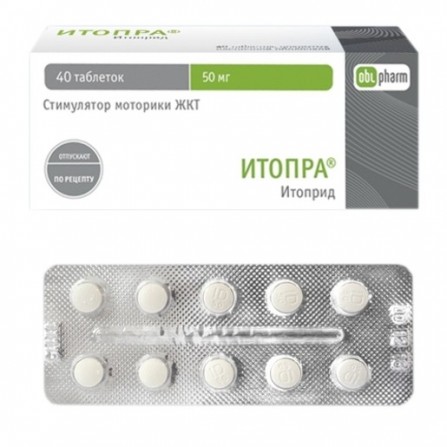Itopra film-coated pills 50mg N40
Condition: New product
1000 Items
Rating:
Be the first to write a review!

More info
Active ingredients
Itopride
Release form
Pills
Composition
Itoprid hydrochloride 50 mg; Excipients: lactose monohydrate - 40 mg, corn starch - 10 mg, hyprolosis - 4 mg, carmellose sodium - 15 mg, magnesium stearate - 3 mg; Film coating composition: opadry OY-S-7223 - 4.8 mg (hyprolosis - 1.51 mg, hypromellose - 1.51 mg, titanium dioxide - 1.51 mg, macrogol 400 - 0.27 mg).
Pharmacological effect
A drug that stimulates GI motility. Itopide enhances GI motility due to antagonism of dopamine D2 receptors and inhibition of acetylcholinesterase. Itopride activates the release of acetylcholine and inhibits its destruction. Itoprid has an antiemetic effect due to interaction with D2 receptors located in the trigger zone. Causes dose-dependent suppression of vomiting caused by apomorphine.; Itopride activates propulsion motility of the stomach due to antagonism with D2-receptors and dose-dependent inhibition of acetylcholinesterase activity; on serum concentrations of gastrin.
Pharmacokinetics
Absorption; Itopride hydrochloride is rapidly and well absorbed in the gastrointestinal tract.; Relative bioavailability of 60%. The maximum concentration in blood plasma; (Stah) - 0.28 micron / ml. The period of reaching the maximum concentration in the blood plasma; (TCAH) - 0.5-0.75 hours after taking 50 mg of the drug. When taken again; 50-200 mg 3 times a day for 7 days, the pharmacokinetics is linear,; drug cumulation is minimal.; Communication with proteins is 96% (mostly with albumin); with alpha1 - sour; glycoprotein - less than 15%; Distribution; Itoprid hydrochloride is distributed in the kidneys, small intestine, liver,; adrenal glands, stomach. The volume of distribution (Vd) is 6.1 l / kg. At therapeutic doses, itoprid hydrochloride slightly penetrates into the brain and spinal cord, as well as into breast milk. Metabolism and elimination; The drug is me! is abolyzed in the liver under the action of flavin-zoree monooxygenase.; 3 metabolites identified, only one of them shows little activity (2-3% of itopride hydrochloride activity), which does not have; pharmacological value.; Itopride hydrochloride and its metabolites are derived mainly by the kidneys. The period; half-life (T1 / 2) is 6 hours, in patients with T1 / 2 trimethylaminuria, increases.
Indications
Symptomatic treatment of functional non-ulcer dyspepsia (chronic gastritis) including: - bloating (flatulence); - pain or discomfort in the epigastric region (gastralgia); - anorexia; - heartburn; - nausea, vomiting; - a feeling of rapid satiety.
Contraindications
- hypersensitivity to itoprid or any excipient of the drug; - gastrointestinal bleeding; - mechanical obstruction and perforation of the digestive tract; - children's age up to 16 years; - pregnancy; - lactation period (breastfeeding); With caution: due to the presence of lactose in the preparation, itoprid is used with caution in congenital lactase deficiency, lactose intolerance, glucose-galactose malabsorption and in geriatrics in elderly patients with impaired liver function and kidney function .
Use during pregnancy and lactation
Drug Itopra; contraindicated in pregnancy and lactation (breastfeeding).
Dosage and administration
Inside, before meals, 50 mg 3 times / day; The recommended daily dose is 150 mg. This dose can be reduced, taking into account the age of the patient.
Side effects
From the hematopoietic system: leukopenia, thrombocytopenia.; Allergic reactions: skin flushing, pruritus, rash, anaphylactic shock; From the endocrine system: gynecomastia, increased prolactin levels.; From the alimentary system: increased salivation, nausea, diarrhea, , abdominal pain, jaundice. From the nervous system: headache, dizziness, tremor.; Laboratory indicators: increased activity of ACT, ALT, GGT, ALP, bilirubin level.
Overdose
Cases of overdose in humans are not described.; Treatment: with a possible overdose, gastric lavage and symptomatic therapy are indicated.
Interaction with other drugs
Metabolic interaction is unlikely, because Itoprida hydrochloride is metabolized by the action of flavin monooxygenase, not CYP450. With the simultaneous use of warfarin, diazepam, diclofenac sodium, ticlopidine hydrochloride, nifedipine and nicardipine hydrochloride, no changes in protein binding were observed. other drugs that are prescribed inside.Particular caution should be exercised when using drugs with a low therapeutic index, as well as sustained release forms of the active substance or preparations with an enteric coating.; funds weaken the effect of the drug.
special instructions
With caution should use the drug Itopra; in patients for whom the occurrence of cholinergic side reactions (associated with an increase in the action of acetylcholine under the influence of the drug), can aggravate the course of the underlying disease.; With the abolition of the drug Itopra; no signs of withdrawal syndrome have been described.; Special precautions are not required when destroying unused medicine.; Impact on ability to drive vehicles and control mechanisms; The action of the components of the drug does not lead to a psychomotor disturbance. However, due to possible side effects (dizziness, tremor), a decrease in concentration of attention and influence on the ability to drive vehicles and control mechanisms cannot be ruled out.





